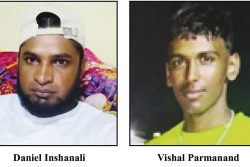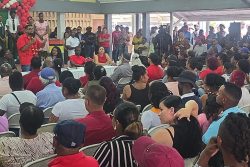What followed was the naked application of vigilante justice against those presumed to have been guilty – the guards who were on duty during the period that the items were stolen. They were rounded up and taken to the Lombard Street premises where inside of its walls they were subjected to a brutal beating and torture in its commonest form. They were hammered with a baseball bat and forced to drink soap water among other indignities. One of the trio sustained two broken hands and head injuries which could have more serious repercussions in the future. Another suffered five fractured ribs and a badly swollen right foot. The other suffered contusions, a swollen eye and has difficulty hearing.
Though warned that they risked further violence, the trio quite properly lodged a complaint with the Brickdam Police Station and then hoped for justice. Perhaps realising that they needed an insurance policy they approached Stabroek News and related their story. Stabroek News duly contacted Mohamed’s Enterprise for a comment on the allegations and not unexpectedly the personnel there were hostile and unresponsive to the queries.
Following the publication of a news item on the beatings the following day, things began rolling. The four suspects who were believed to have inflicted the vicious beatings were arrested and taken down to the Brickdam Police Station. This in turn triggered a bid to spare the four suspects from the charges that were likely. In the station, no less, the victims were canvassed by an attorney on behalf of the men. The haggling over the compensation that the men were prepared to accept in return for not proceeding with their complaint was swift and brutal. Relatively large sums were offered to the men before they agreed not to proceed. The men then reported to SN that they thought the acceptance of the compensation was the best course of action open to them and the police’s view of the matter was that there was no way a sustainable case could be made out against the assailants without the statements of the victims. Case closed.
First, the disposition of Mohammed’s Enterprise in this matter is reprehensible. The guards were clearly beaten and tortured in an attempt to recover the company’s property. This is not the type of conduct that is expected of anyone much less on behalf of a company in the private sector that expects to benefit from the rule of law. It should explain what it knew of the beatings and what it intends to do about the quartet who carried it out. The Company should also ensure that the health needs of the men are properly looked after notwithstanding the compensation that was paid to hush up the matter. If Mohammed’s Enterprise is a member of the Private Sector Commission (PSC) or one of its constituents then the PSC or the relevant constituent should do its best to ensure that the company sets the record straight. Whether by police, a private company, in a bar or in the premises of a place of worship, torture cannot be ignored.
Just as important is the glaring, evident realization among the perpetrators and the victims that the established criminal justice system was not the place to go for redress. The beaters clearly calculated that there was going to be a long drawn-out process with no guarantee of the recovery of the items and quick prosecution. After they were savaged, the guards utilised publicity surrounding the story as a lever for cash rather than believing that they could trust the police to proceed quickly enough for justice to prevail.
It has been this way for many years now – there is a parallel justice system. The hapless labourer and bewildered cart man have to face an uncertain justice in the formal courts and, of course, they are made examples of. Those with connections and deep pockets can decide what brand of justice they wish to pursue.
Under normal circumstances, both the government and the police should be alarmed at the turn of events in the Mohamed’s Enterprise case and would have been doing their utmost to ensure the prosecution of the assailants notwithstanding the hush money that had been paid.
Sadly, both the government and the police are content with this troubling type of manipulated justice and the worst part about it is that the sickness has seeped into virtually every sector of society.
Take for instance the ruling earlier this month that the UG lecturer, Mr Evan Radhay Persaud would be allowed to resume his duties as a lecturer but with a “stern” warning. It wasn’t a proud moment for the University of Guyana. As a matter of fact it was a positively humiliating moment and one that calls into question whether the university can be seen as capable of providing redress to its students when a complaint is lodged by them against a lecturer. For starters it is important to know that Mr Persaud has strong ties to the government via the Indian Arrival Committee which was created to counter the Guyana Indian Heritage Association. So from the outset there was great scepticism that a complaint against Mr Persaud, particularly in the arcane dynamics of the politics at the University of Guyana, would be properly investigated.
And didn’t the university and its agents make a right mockery of the process. A special committee somehow managed to deny Mr Persaud material to which he should have had access to ensure the fairest process possible. Further, the committee sought to demolish transcript testimony by the complainants because there were no signatures of complainants. The legal firm that reviewed the university’s case commented adversely on both of these transgressions by the committee and recommended that the report be rejected and a ruling made in Mr Persaud’s favour or a new committee be reconstituted to revisit the complaints.
The University Council shockingly failed to opt for the latter which would have given both sides the fullest opportunity to present their case. Upon receiving the law firm’s report, the UG council should have dismissed the committee making a special note to ensure that none of them ever sat again on such an inquiry and then embarked anew to enquire into the charges. Unfortunately, the university is now saddled with the image that politics and opportunism have rendered it incapable of adequately responding to complaints made against one of its lecturers. It was a most shocking outcome.
Both of these cases are the fruit of the disdain for law and order accrued over 12 years of President Jagdeo’s tenure and highlighted by the rampage of imprisoned drug trafficker Mr Roger Khan and his phantom squad.
Local listeners knowledgeable of this government’s track record would not have been amused by President Jagdeo’s lofty rhetoric at the just concluded UNASUR summit about adherence to human rights and the rule of law. The President and his government have much work to do to live up to those standards so that a proper example can be set for Mohamed’s Enterprise and others.








